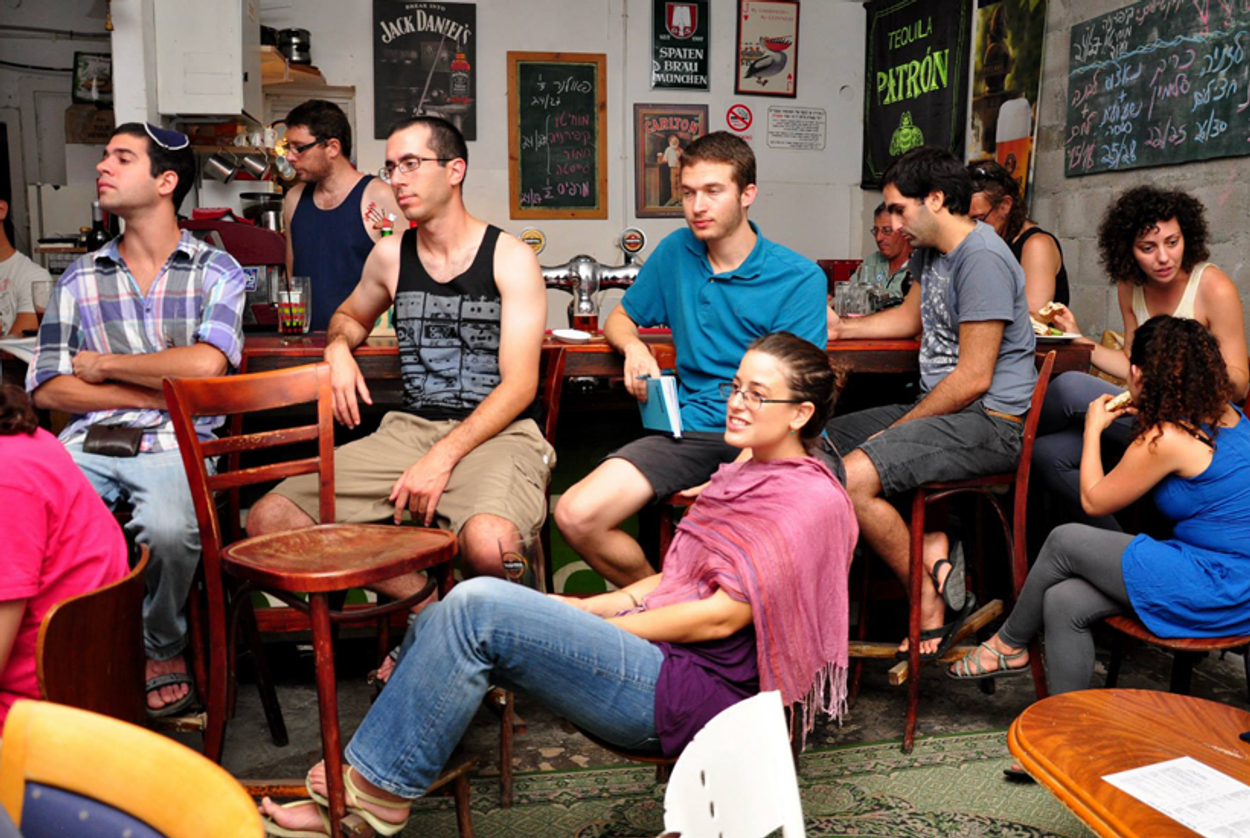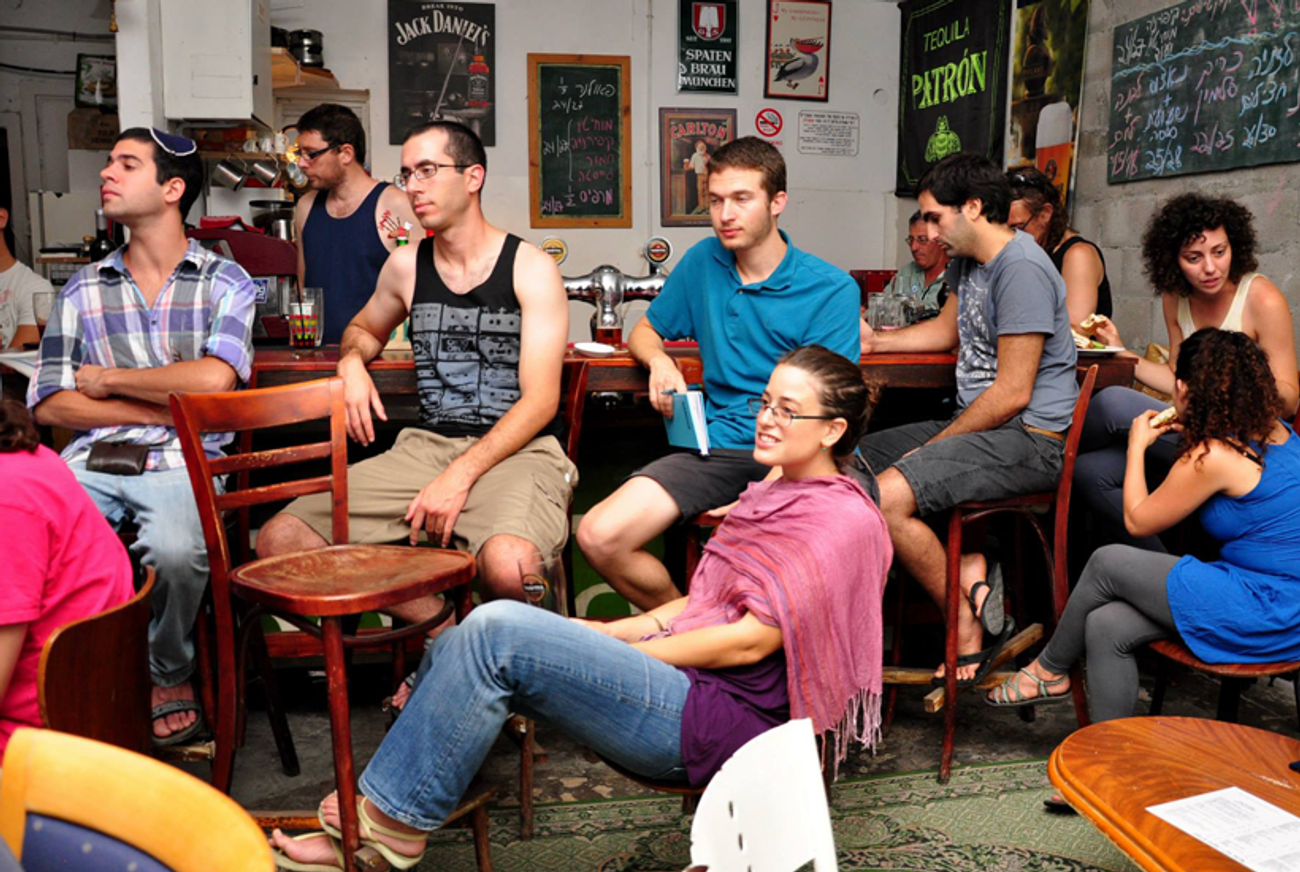In Israel, Cooperative Restaurants Put Politics on the Menu
They focus on fairness, community, and social justice—rather than profit. And some of the food is pretty good, too.




In the hottest months of 2011, tents spread like summer weeds across Tel Aviv’s Rothschild Boulevard. A young generation many had written off as apathetic was fed up with ballooning living costs, limited workers’ rights, and a growing divide between rich and poor. Their makeshift tent camp in Israel’s metropolitan core inspired protests around the country, as demonstrations increased by the tens of thousands.
Though the tent camp began as a statement about housing costs, the countrywide protests reflected a greater sense of economic discontent. “After the protests, people became aware that there are other ways of doing business,” said Yifat Solel, chairperson for the Cooperatives Alliance for Social, Economic, and Environmental Justice. “And the best concrete way of changing the economy without changing the government is to start cooperatives.”
Co-ops are democratically run businesses built around cooperation instead of competition. Members buy in to become joint owners; they pool resources and divide responsibilities in hopes of creating a fair and equal business environment. Some 30 new cooperatives—from supermarkets to a social workers’ co-op—have formed in Israel since the protests, Solel told me in an interview recently; she says she gets two calls a week from new groups interested in forming co-ops.
Solel is herself a co-founder of one such business: Bar-Kayma, Israel’s first cooperative restaurant, which opened a year after the protests, in July 2012. It’s part vegan restaurant and bar, part community center and activist hub—all wrapped up in a sprawling, three-story building in Tel Aviv’s Florentine neighborhood.
“At a certain point, it became clear that we wanted to be the change we were talking about,” said Dafna Brenkel, another co-founder of Bar-Kayma. “In the [tent] camp, we had a communal kitchen, and workshops, and different attempts at different lifestyles. We asked: How do we keep this community going in a sustainable, permanent way?”
Bar-Kayma opened with roughly 70 members and now has over 400; membership costs a one-time fee of 1,000 shekels—roughly $300. Paying the fee is like buying citizenship in a democracy; members can participate as much or as little as they want but are guaranteed full and equal voice in how the business is run.
From the outset, the members had a few core goals: open debate, communal decision-making, and ecological sustainability. All these lent to a larger desire to build a business not “as a pyramid, but as a circle,” said Brenkel. In that circle, all employees earn equal wages: 28 shekels (over $8) an hour, more than 20 percent higher than Israel’s minimum wage. Members who aren’t employees can earn virtual currency by volunteering in the rooftop garden or leading a workshop. Or they can just sit and chat idly over discounted food and drink—a popular option.
Beyond its political tenets, Bar-Kayma’s appeal is thanks in large part to head chef Ilan Peled, who joined the cooperative in August 2013. He brought consistency and quality control to a menu that had been constructed by a team of volunteers who had little formal restaurant experience, and he added a few dishes of his own. Peled focuses on seasonal food, and the activist “lets the ingredients speak for themselves.”
The vegan menu is indeed quite basic: mostly pastas and salads, though a “cream” sauce for the mushroom linguine will have you fooled. There’s also vegan shwarma, and bourekas, and standard Israeli fare like whole roasted eggplant in tahini—the latter an impressive take on a ubiquitous dish, perfectly warm, with delicious char from the eggplant balanced with thick tahini. Several items shine, from his cashew and almond cheeses to his flaky “crispy roll” filled with spinach, tomatoes, and onions.
“It’s simple, cheap, clean food. And the most important thing is that it is fresh,” said Peled. “If you have a tomato, it should taste like a tomato, not like cinnamon.”
Can a cooperative restaurant succeed commercially? Conservative estimates predict that 80 percent of new restaurants in Israel will fail within their first two years. But this summer, as Bar-Kayma celebrated its second anniversary, it also broke even for the first time. Members have no illusion of earning a return on investment; their aim is sustainability, not profitability. If Bar-Kayma finds itself with surplus funds, it will either raise employee wages or decrease food prices.
But the restaurant’s ultimate goal isn’t merely about money: “We want to take over the world,” said Brenkel, “and change it.”
One cooperative restaurant can’t change the world, but other cooperative cafés have already opened in Bar-Kayma’s wake—in Kiryat Shemona and Haifa. And a cooperative pub is set to open in Jerusalem in September.
“This is one of the few aspects in Israeli society that we can talk about in positive terms,” said Solel. “It’s an emerging movement, and every day there is more interest, more awareness, and more power. Because the main thing about the co-op movement is that it’s not just the strength of a specific enterprise, but the strength of the whole thing.”
***
Late this July, an eclectic group of 20—from dreadlocked youngsters to buttoned-down business men—crowded into a small community center room in Jerusalem’s Kiryat HaYovel neighborhood for the first general assembly of The Mifletzet Bar & Café, a new cooperative set to open in September. The co-op takes its name from a prominent piece of public art in the neighborhood: HaMifletzet (Hebrew for “the monster”) is a grotesque, spotted-monster sculpture, with a massive red tongue lolling from its mouth. It’s the only noteworthy thing in an otherwise nondescript neighborhood—one without bars, pubs, or nightlife.
“We are a community-oriented initiative,” said Eli Shmueli, one of Mifletzet’s original 15 members. “We don’t have neighborhood pubs like Tel Aviv and Haifa. We want a place to hold concerts or parties and all sorts of community events.”
Mifletzet will transition from a café in the morning into a pub at night. Members haven’t yet decided on a menu, but they envision their co-op as a comfortable meeting place where neighbors can relax over affordable food and drink without having to drive into the city center.
Though Mifletzet modeled itself after Bar-Kayma, it bears more similarities to yet another recent cooperative: Bar-Galim, a cooperatively owned bar/café in Haifa’s Bat-Galim neighborhood.
“Bar-Kayma was our inspiration, but our idea was different,” said Yonatan Naftali, one of Bar-Galim’s founders. The idea was to create a social space that could serve as platform for “social, cultural, music, and art events” for community members and Haifa’s large student population. Naftali, a medical student at the Technion, found a location in July 2013—an abandoned eyesore in the neighborhood—and the restaurant opened that October. The bar became a neighborhood pet project. Furniture donations came rolling in. Volunteers cleaned, excavated, and renovated the space. They built an impressive wooden L-shaped bar and stocked the kitchen with donated dishes and silverware. Even the electricity and plumbing were done by volunteers. Though when the power suddenly shut off during a recent visit, Naftali shrugged his shoulders with a look of casual indifference: “That happens, every now and then,” he told me.
Bar-Galim opened with 40 members, and now has 65; membership costs a one-time fee of 1,000 shekels. Like Bar-Kayma, Bar-Galim pays workers a higher wage than most restaurants. Unlike Bar-Kayma, however, it is a registered nonprofit. Any extra money after wages—of which there is some, but not much—is put toward free concerts and events for community members or is donated to a worthy cause. Right now members are selling books to raise funds for elementary-school students who can’t afford summer camp.
“We are kind of the neighborhood version of Bar-Kayma,” said Naftali. “They are looking at national social justice, we are more looking at justice on the local level.”
Bar-Kayma’s sprawling space, chic interior, and stellar menu not only befit its grand aspirations, but are vital in Tel Aviv’s hyper-competitive restaurant scene. Bar-Galim, fitting for its neighborhood agenda, has a more modest appeal. The few dining tables wobble on the floor’s semi-finished tile job. Couches and cushioned chairs are worn, and not even close to matching. A part of one wall is simply exposed cinder blocks.
The menu is a straightforward thing that seems to say: “by students, for students.” It features a few sandwiches and vegetable plates with bread and different dips or cheeses. There are rotating specials like eggplant lasagna, or pizza toast. “We had to keep it simple, because the kitchen is very basic,” said Assi Syrkin, Bar-Galim’s manager and one of the few people involved who had prior restaurant experience. “We wanted something fun, nice, and tasty to bring people back.”
In that regard, they’ve succeeded. Dominic Hawkins made aliyah from England three years ago and has been coming to Bar-Galim since it opened. Prior to the restaurant’s opening, Hawkins struggled to fulfill his favorite British pastime of “going to a bar and getting drunk.”
“I really missed that,” he said.
Hawkins emphasized that Bar-Galim is about more than just food and booze. “When you first get [to Israel] you’re just lost and your Hebrew is rubbish,” he said. “For me, I could spend all day not talking to anyone. Here there is a community. It’s home, I love it.”
***
While Bar-Kayma’s model emerged from the social justice protests, it’s this sense of community, of home, that drives the cooperative restaurant movement forward. Forming a community around a business presents several crucial advantages. Risk is diffused across many shareholders, rather than one or two owners. Many members means many mouthpieces who can market and promote the business. Though communal decision-making is often slow, it means a co-op can adapt to the community’s needs. Without an owner at the top—whose sole goal, presumably, is profit—co-ops can keep prices low and pay their employees more.
There’s one more co-op in Kiryat Shemona—Hevruta, a teensy neighborhood café that opened in March 2013—and whispers of more to come: another café in Haifa, and a restaurant in Tel Aviv’s underserved Shapira neighborhood.
The criteria used to judge restaurants—food, service, ambiance—have long been fixed. Cooperative restaurants rely on an assumption that these traditional standards about what makes a restaurant “good” can change.
“When I went to [Bar-Kayma] I got the impression that it was different,” Yonathan Cohen, former lifestyle editor of the Jerusalem Post, told me in a telephone interview. “In Tel Aviv, everyone is looking for a concept. And this whole concept of cooperative and community is a trend that is really taking off. I believe the next cool thing could be doing good and bringing ‘good’ into the restaurant scene, and not just because people want to be trendy, but I think people are looking for a bit more meaning rather than just going from restaurant to restaurant, or bar to bar.”
I asked Syrkin if cooperative restaurants were, in fact, becoming trendy.
“Trendy is not the right word,” he said.
I asked him what word would be better. He replied: “Necessary.”
***
Like this article? Sign up for our Daily Digest to get Tablet Magazine’s new content in your inbox each morning.
Raffi Wineburg is a freelance journalist from Seattle.
Raffi Wineburg is a freelance journalist from Seattle.